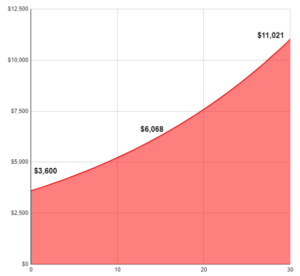“Only a 10% return on investment?! I’ll just take the money I’d use to buy solar and just invest it, getting way better returns. Pass.”
We’ve been selling residential solar panels for almost a decade so we are fairly used to this objection. Firstly, we’d like to say congratulations! Averaging a 10% return is great, but it does overlook one key point- spending money on solar is reducing a current, compounding expense while pure investing is taking liquid cash and contributing to a compounding revenue stream. With solar, we are proposing you reallocate the money that were previously promised to your utility company (i.e. your electricity bill) and pre-pay that electricity expense with solar.
The Cost of Electricity
Let’s break down the cost of powering your home. You receive a electric bill monthly, either electronically or through the mail. You may have noticed this bills fluctuates, depending on how much power you’ve used in the past month. The electric company charges you for each kWh that you consume, which is typically expressed by price per kWh.
The Cost Now
Next, let’s assume you pay a $300 electric bill due every month (that’s around 1,875 kWh per month, assuming a price of 16 cents per kWh). Annually, you’ll owe $3,600 to your utility for the electricity you use (12 months per year * $300 monthly average).
The Cost in the Future
$3,600 is a lot of money, and over 30 years, is over $100,000 that you’ll have to give to your electric company. But that’s not even the half of it- literally. In Maryland, the cost of residential electricity has been increasing by an average of 3.8% every year since 2002. Even if your usage does not change at all next year, you will owe more than you did this year. Just compare a bill you have from this year to last year’s!
To illustrate, if you owe $3,600 this year, you will owe $3,737 next year (an increase of 3.8%). Granted, that’s not too terrible (it only breaks down to an extra $11.40 per month), but consider how much that will rise over 30 years (coincidentally, how long our solar is warrantied for).
To determine the true cost, we have to see how much we will owe in year 30, using a compounding rate.
-
The formula for calculating a compound over a period of time:
-
New Annual Payment = Current Annual Payment * (1 + yearly rate)^Years
-
New Annual Payment = $3,600 * (1 + .038)^30
-
New Annual Payment = $11,021
Now, that’s a lot more than $3,600 per year (in fact, that’s $918.43 per month, over $600 more than the starting amount). Most importantly, in 30 years, you will have paid out more than $200,000 to the utility company!

Remember, this is assuming your usage doesn’t change at all (fingers crossed). That $200k or so is already promised to the utility company- you just haven’t paid it yet. Your only alternative is to stop using electricity…or to replace your utility provider by switching to solar.
The Cost of Solar
To illustrate our point, let’s look at a typical solar system and the cost breakdown.
-
Typical Cost: $35,000
-
Federal Tax Credit: $10,500
-
30% of total system cost
-
-
Maryland Tax Rebate: $1,000
-
Estimated Energy Credit Payments: $5,340
-
Based on the output of the system
-
-
Anne Arundel Property Tax Credit: $2,500
-
County-specific tax credit
-
-
While the details will change per system, this is a typical breakdown of the main incentives for solar. After all incentives, the net system cost is $15,660. If we assume that this solar system offsets your usage 100%, you will not have any more electrical expenses (minus a small connection fee for most utilities). $15,660 is still a lot of money, but it locks in your electric cost, and is much less than the $200k that you would instead be sending to the electric company!
Conclusion
The argument that you could get better returns investing in the stock market quickly falls apart when you realize that you will still have to make those rapidly compounding electricity payments.
Finally, as you are not making money but instead reducing an expense, you have no additional taxes on the money that you are saving by switching to solar!
We would love to schedule some time to show you the amount you could save, based on your specific situation. Schedule a call with us to see how pre-paying your electric cost is the best way to save money!


